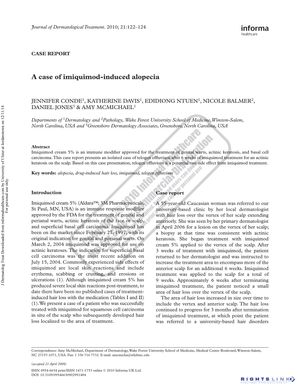TLDR Imiquimod cream can rarely cause temporary hair loss.
In 2010, a case report described a Caucasian woman who developed telogen effluvium, a temporary hair loss condition, following the use of imiquimod cream 5% to treat actinic keratosis on her scalp. The hair loss occurred in the treated area about 6 weeks after she completed a 9-week course of imiquimod. Scalp biopsies showed an increased telogen to anagen hair ratio, confirming the diagnosis of telogen effluvium. Her hair loss resolved within 5 months after discontinuing the imiquimod treatment. This case indicated that telogen effluvium could be a rare adverse effect of imiquimod, especially when used on the scalp, and it underscored the need to watch for hair loss during and after using imiquimod.
 144 citations
,
July 2002 in “Clinical and Experimental Dermatology”
144 citations
,
July 2002 in “Clinical and Experimental Dermatology” Telogen effluvium is a common type of hair loss that can resolve on its own or become chronic, with treatment depending on early diagnosis.
 January 2022 in “Dermatology Review”
January 2022 in “Dermatology Review” Higher IL-31 levels are linked to worse itching in chronic kidney disease patients.
 98 citations
,
May 2008 in “British Journal of Dermatology”
98 citations
,
May 2008 in “British Journal of Dermatology” There are many treatments for permanent hair loss disorders, but their effectiveness varies and there's no clear best option.
 1 citations
,
November 2014
1 citations
,
November 2014 The document explains hair and nail biology, common hair loss conditions and treatments, oral and genital skin diseases, and the risks and treatments associated with squamous cell carcinoma.
 20 citations
,
July 2008 in “Dermatologic Therapy”
20 citations
,
July 2008 in “Dermatologic Therapy” The document says that treating the root cause of hair follicle damage is crucial to prevent permanent hair loss, and treatment options vary.
 April 2010 in “Reactions Weekly”
April 2010 in “Reactions Weekly” A woman's hair loss was likely caused by a cream used for skin treatment and improved after she stopped using it.






